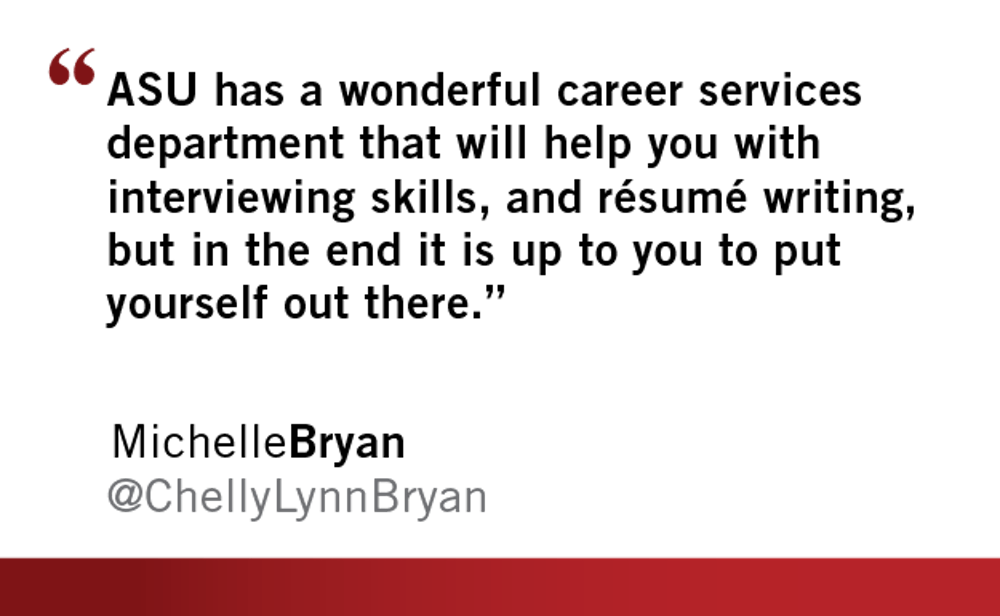Since the financial crisis, the dynamics of success have changed greatly in the U.S., leaving many college students and recent grads scratching their heads, wondering if they are making the right decisions for their future when choosing everything from a major course of study to which university to attend.
Some of the prerequisites in life are the same as follows: Find a good institution that will prepare you for the challenges in life to come. But what does that mean exactly? How do you define "challenge" in today’s complicated professional spectrum?
In response to fellow columnist Becca Smouse’s column, “College grads deserve better real-world preparation,” I must argue that ASU and other universities across the nation can no longer be the driving force that prepares you for the real world. Truthfully, we live in a harsh society. No one is going to hold your hand and train you to do a job that you have no experience in just because you have educational credentials.
What impresses employers is when you can show them that you not only worked hard academically, but that you also worked from the ground up, seeking internship opportunities and crummy paying service sector jobs that prove that you really know what it’s like to eat dirt. How those recommendations and references play out can set the stage for the rest of your professional career.
Sure, academic institutions can tell you how hard life is and help you prepare a résumé, but really it’s nothing you haven’t already heard in high school. Nothing is more organic than experiencing life itself, and yes, unfortunately, that means life the hard way, SpaghettiOs and all. Once students graduate they are not simply “thrust into the real-world.” If you have been spending the last four years of your life not living in the real world, then where have you been living exactly?
So, you want an internship or part-time job in your field of study — now what?
Think like an unemployed, experienced professional. I am sure it is daunting, the thought of flipping burgers at McDonald's or waiting tables, but you don’t have to. A biology major may think it is impossible to get a part-time job working in her field without any experience under their belt. This is incorrect.
The key is networking. LinkedIn, the world’s largest professional networking site, is making that happen for thousands of employed and underemployed individuals. So, your dream job is to work for a large corporation like DuPont, or Coca-Cola someday? Start making yourself present now! Create a professional profile on LinkedIn and connect with the companies that most interest you. Very often HR directors and other top execs are also connections that you can network with, and most are happy to answer any questions you have about their companies.
Another great way to utilize LinkedIn is by joining professional groups. Get in on the conversations, introduce yourself as a student seeking employment – you never know who you might meet.
Finally, scour the jobs section. This can help you understand the types of positions available in your field and what type of experience is needed. If you don’t have the experience or the degree yet, that doesn’t mean you can’t get your foot in the door at a top company. Many large corporations are willing to hire assistants and office help, don’t expect those jobs to be advertised. It never hurts to send in a résumé to a company showcasing your educational background and career goals. Employers usually want to hire someone who has an eagerness to learn even if it is by observation.
If there is one thing I can agree on in Smouse’s article, it's that “personal branding from day one and great PR techniques help students look good for employers.” ASU has a wonderful career services department that will help you with interviewing skills, and résumé writing, but in the end it is up to you to put yourself out there.
Keep your eye on the prize and stay focused on what you want. In college, it is not always about a paycheck, but it is about the experience, so keep calm and carry on. For now, buy yourself a ramen noodle cookbook and join the ones who have been there, because one day, it will pay off.
Reach the columnist at Michelle.Bryan@asu.edu or follow her on Twitter @ChellyLynnBryan
Editor’s note: The opinions presented in this column are the author’s and do not imply any endorsement from The State Press or its editors.
Want to join the conversation? Send an email to opiniondesk.statepress@gmail.com. Keep letters under 300 words and be sure to include your university affiliation. Anonymity will not be granted.
Like The State Press on Facebook and follow @statepress on Twitter.





